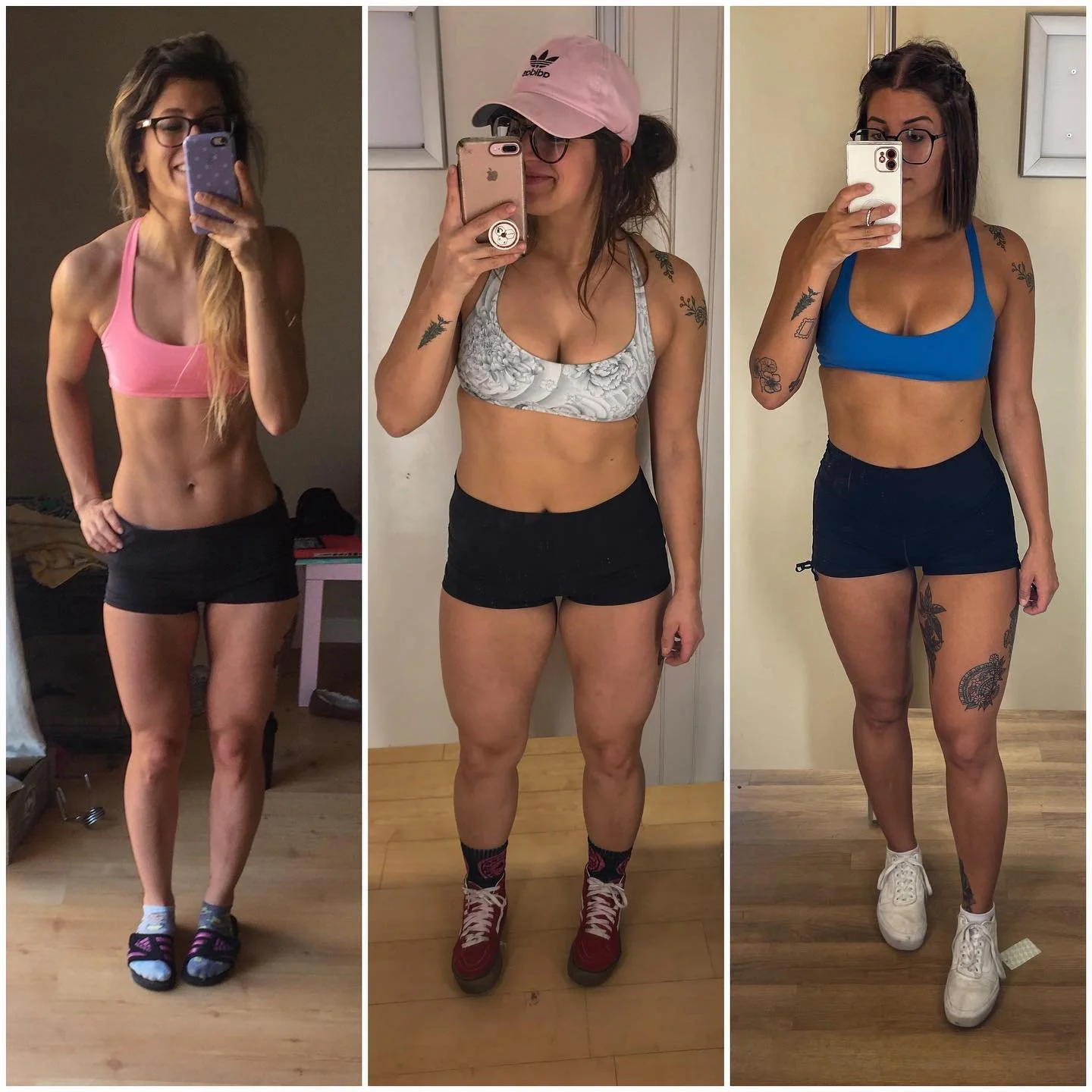
WELCOME TO OUR BLOG
SEARCH FOR AN ARTICLE
So You Want to Consume Less Alcohol
In this blog post, we’re breaking down the biggest takeaways from our latest Black Iron Radio episode all about alcohol—specifically, how to drink less (or not at all) and still feel like yourself. Whether you’re sober-curious, trying to cut back, or just wondering if alcohol is getting in the way of your goals, this conversation is packed with practical advice and honest reflections. Coaches Ryann, Amanda, and Chloe share their personal experiences with drinking less, the science behind alcohol’s effects on your body and mind, and how to navigate social situations without the booze.
Breaking Up With Food Guilt (For Good)
In this blog post, we’re diving into key takeaways from our latest podcast episode on food guilt. We break down the conversation with actionable strategies to help you shift your mindset, break free from guilt, and develop a healthier relationship with food. If this resonates with you, be sure to check out the full episode for an even more in-depth discussion!
So You Want to Manage Stress Better
In this blog post, we’re expanding on key takeaways from our latest podcast episode on stress management. We break down the conversation with actionable insights on handling stress through nutrition, recovery, and mindset shifts. If this resonates with you, be sure to check out the full episode for even more in-depth discussion!
Tracking Macros & Transitioning to Macro-Free: When & How to Make the Shift
Tracking macros is a powerful tool for understanding nutrition and achieving specific performance and body composition goals. However, it isn’t something that needs to be done forever. In this post, we’ll explore the benefits of macro tracking, the skills it teaches, and how to smoothly transition to a macro-free approach when you’re ready.
Emotional Eating: Practical Tips to Retrain Your Brain
Struggling with emotional eating? You’re not alone. Learn how emotional eating works, why we turn to food for comfort, and practical steps you can take to break the cycle and build healthier coping habits. Discover how to create a balanced relationship with food while still enjoying what you love.
Body Image: How Social Media Affects Our Perception
Social media can be a double-edged sword—while it connects us, it also distorts our perception of body image. Discover how to navigate this digital landscape and protect your mental health by embracing a more positive relationship with your body.
Stop Saying “Cheat Meal”
Using the term ‘cheat meal’ can create an unhealthy relationship with food, leading to guilt and an all-or-nothing mindset. Learn how adopting a more flexible approach to eating can help you enjoy your favorite foods without the need for ‘cheating.’
A Relationship with Food Worth Building
Looking back on my journey, I can pinpoint several transformative shifts that allowed me to reclaim control over my relationship with food. Each change didn't happen overnight, but was a gradual process of learning, unlearning, and healing. Having a coach by my side was invaluable, providing the guidance, support, and perspective I needed to navigate these complexities.
Overcoming Negative Self-Talk During Life's Changes
I was really struggling with something recently, and after doing my check-ins with my clients that day, I realized that so many of you guys struggle with the same thing.
Coaching is Collaborative
I think it's easy to forget that coaching should be a 2-way street. Yes, there is a level of trust and respect that should go into the relationship you have with your coach, but to get everything you can from your experience and investment, there should always be an active conversation going. So what does this mean for clients?
How to change your thoughts around food and diet culture
When we start making nutrition changes, I think we all start looking for “progress”, and that’s fair! Progress photos and measurements are so useful, but we CANNOT overlook our mental progress. We can't only feel good about ourselves when we’re eating all the “right” foods, or when we’ve seen progress in the form of a smaller waist. If we’re solely focused on eating “healthy” and “good” foods all of the time, and then hate ourselves the second we eat something “unhealthy,” I’d argue that’s not very healthy at all.
If you’re gonna quit, quit on a good day
I read this quote the other day, “If you’re gonna quit, then quit on a good day” and that hit.
Can you imagine how many people wouldn’t give up on themselves if they utilized this statement more often
If things are going good, you're “winning”, it’s easy, results are showing, we aren’t often giving up, or running to something different.
When we’re stuck, frustrated, have a bad day, lose, our thoughts can often lead us to wanting to quit, give up, change, think something is wrong. Cuz to be honest it’s hard.
How to achieve your ideal body
It is really common to see clients mention in the first few weeks or months of working with a nutrition coach that they’re disappointed when they see the scale go up.
From experience, many clients come to a nutrition coach chronically dieting, eating in a caloric deficit, or undereating for longer than 3-6 months. It is imperative that they reverse diet back up to at LEAST their maintenance calories and spend at least 3-6 months eating enough food to boost their metabolic rate. This will allow them to lose more weight effectively in the future. Your metabolism slows down when you eat lower calories, so as calories increase, your metabolism should increase as well.
How can I loose weight fast, but in a healthy way?
I had a friend ask me this question the other day and it led me to understand that most of us really want weight loss to happen as fast as possible. But in order to lose weight quickly, it’s often not going to happen in what I would consider a “healthy” way.
There are so many “diets” out there that have you restrict so many calories that you no longer have the energy to exercise; high fat, no carb, meal replacements, you name it, it’s out there. And about 95% of the time my clients tell me they have tried some, if not all of these kinds of diets. They come to me worn out from it all.
The key to being successful with your nutrition
My face when a client says they are upset they “only” lost half a pound this week 😡
The toughest part about being a nutrition coach is getting clients to buy in on a few ideas.
How to stay consistent when things get boring
Look, I know I JUST said I want you to be bored. But I also want you to have fun!
For some people, it’s hard to find joy in the grind of the process even if they know deep down it’s worth it. If you can trick yourself into enjoying the tedious need-to-dos, the odds of sticking with lifestyle changes, reaching your goals, & maintaining progress long term are much greater.
How can you reframe or remix the boring stuff to feel fresh & fun?
Consistency is Boring
At some point, the daily tasks and habits necessary to reach your goals are probably gonna feel pretty boring. Consistency is boring, but it’s where progress is made.
Constant changes - with your macros / nutrition, training program, daily routines - are just whirlwind. If a coach (of any kind) is promising instant gratification and keeps things “interesting” or keeps you “motivated” by switching things up very regularly with no explicit purpose, proceed with caution.
What is Body Neutrality?
Me when I try to explain body neutrality…
A body is just a body. It doesn’t have moral value. It changes as you change. There’s nothing inherently good or evil about it. I used to think I had to constantly, aggressively love my body- if I didn’t feel that way on a day, I felt like I was failing or not being “positive” enough.
What I Learned from a 365 Day Habit
In 2021, I committed to walking one mile per day. When I told people I was doing a mile a day they always looked at me funny because they knew that I had a moderate level of fitness and could run much longer distances. But I knew I couldn't commit to running or even walking those longer distances consistently every single day for an entire year.
Pre & Post Surgery Nutrition
When you have surgery of any sort, your body has a heightened level of stress and inflammation. You want to minimize that to support your body’s recovery process. Oftentimes skin or tissue is torn and in need of repair. On top of that, when you have surgery, it's likely that you are not getting as much movement as you're used to. Considering all of these factors, here is what I recommend adding to your routine to help you recover better and faster.




















